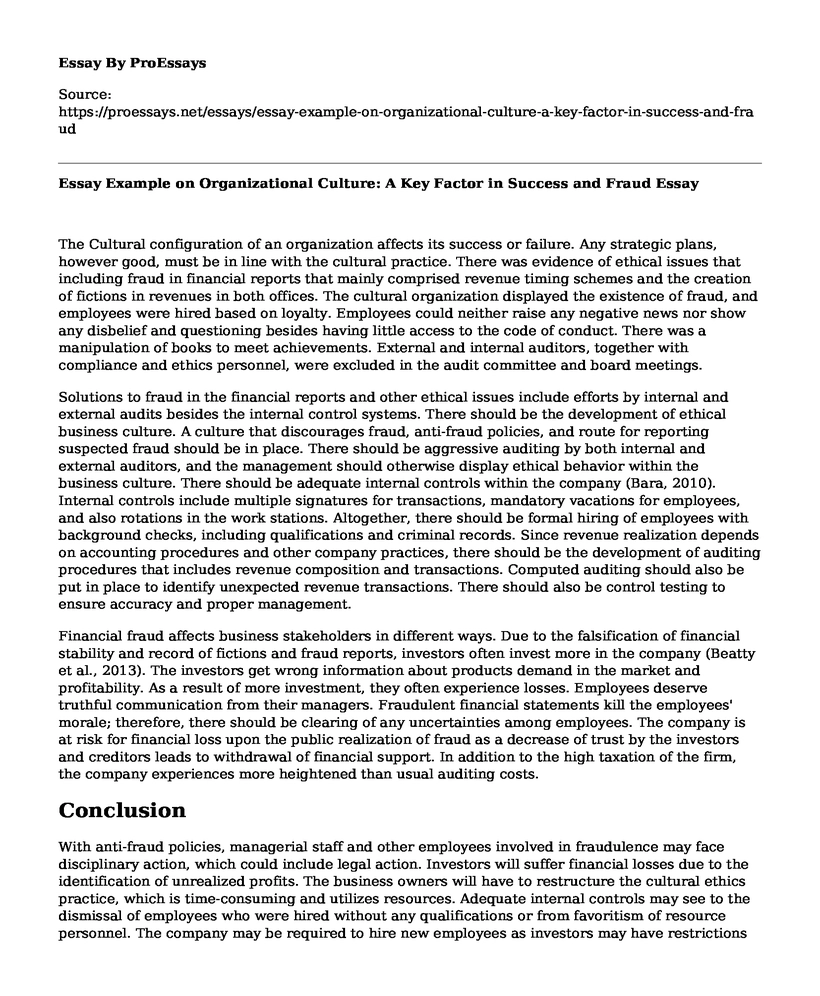The Cultural configuration of an organization affects its success or failure. Any strategic plans, however good, must be in line with the cultural practice. There was evidence of ethical issues that including fraud in financial reports that mainly comprised revenue timing schemes and the creation of fictions in revenues in both offices. The cultural organization displayed the existence of fraud, and employees were hired based on loyalty. Employees could neither raise any negative news nor show any disbelief and questioning besides having little access to the code of conduct. There was a manipulation of books to meet achievements. External and internal auditors, together with compliance and ethics personnel, were excluded in the audit committee and board meetings.
Solutions to fraud in the financial reports and other ethical issues include efforts by internal and external audits besides the internal control systems. There should be the development of ethical business culture. A culture that discourages fraud, anti-fraud policies, and route for reporting suspected fraud should be in place. There should be aggressive auditing by both internal and external auditors, and the management should otherwise display ethical behavior within the business culture. There should be adequate internal controls within the company (Bara, 2010). Internal controls include multiple signatures for transactions, mandatory vacations for employees, and also rotations in the work stations. Altogether, there should be formal hiring of employees with background checks, including qualifications and criminal records. Since revenue realization depends on accounting procedures and other company practices, there should be the development of auditing procedures that includes revenue composition and transactions. Computed auditing should also be put in place to identify unexpected revenue transactions. There should also be control testing to ensure accuracy and proper management.
Financial fraud affects business stakeholders in different ways. Due to the falsification of financial stability and record of fictions and fraud reports, investors often invest more in the company (Beatty et al., 2013). The investors get wrong information about products demand in the market and profitability. As a result of more investment, they often experience losses. Employees deserve truthful communication from their managers. Fraudulent financial statements kill the employees' morale; therefore, there should be clearing of any uncertainties among employees. The company is at risk for financial loss upon the public realization of fraud as a decrease of trust by the investors and creditors leads to withdrawal of financial support. In addition to the high taxation of the firm, the company experiences more heightened than usual auditing costs.
Conclusion
With anti-fraud policies, managerial staff and other employees involved in fraudulence may face disciplinary action, which could include legal action. Investors will suffer financial losses due to the identification of unrealized profits. The business owners will have to restructure the cultural ethics practice, which is time-consuming and utilizes resources. Adequate internal controls may see to the dismissal of employees who were hired without any qualifications or from favoritism of resource personnel. The company may be required to hire new employees as investors may have restrictions to certain information and transactions. Due to the use of computed auditing test controls, the staff can no longer manipulate books. At the same time, investors may have to look for other investment companies due to loss of profits and limited growth, unlike the usual cases. Besides, the owners may result in increased expenditure to provide the required resources. With the different solutions to fraud in the financial department, developing an ethical business culture would be the most appropriate. The business image and mission to the public, routine, and systems of control that reflect on honest business can help manage fraud in the financial statements.
References
Barra, R. A. (2010). The impact of internal controls and penalties on fraud. Journal of information Systems, 24(1), 1-21.
Beatty, A., Liao, S., & Yu, J. J. (2013). The spillover effect of fraudulent financial reporting on peer firms' investments. Journal of Accounting and Economics, 55(2-3), 183-205.
Rezaee, Z. (2005). Causes, consequences, and deterence of financial statement fraud. Critical Perspectives on Accounting, 16(3), 277-298.
https://en.m.wikipedia.org/w/index.php?title=Internal_control&action=edit§ion=14
Cite this page
Essay Example on Organizational Culture: A Key Factor in Success and Fraud. (2023, Jul 21). Retrieved from https://proessays.net/essays/essay-example-on-organizational-culture-a-key-factor-in-success-and-fraud
If you are the original author of this essay and no longer wish to have it published on the ProEssays website, please click below to request its removal:
- Report on Johnson & Johnson's Company - The Organization Profile
- Digital Culture Transformation Paper Example
- Essay Sample on Mortgage Interest Rate
- Essay Sample on Corporate Cultures
- WaPo Post on Al-Baghdadi's Death: 3 Steps to Comprehend Misrepresentations - Essay Sample
- Essay on Privacy & Security: A Closer Look at the Rights and Protections
- Essay Example on Flawed Strategic Plan Led to Poor Decision-Making in Business







